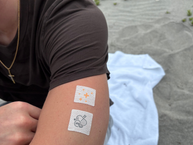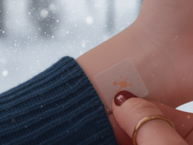Glutathione is an antioxidant that your body can produce in your cells from amino acids glutamine, glycine, and cysteine. It’s not considered an essential nutrient, but low levels can have negative effects. Here are some health benefits of glutathione and how the Glutathione Plus Patch by PatchAid can supply more.* Be sure to talk to your healthcare provider before using any nutritional supplements.
Health Benefits of Glutathione*
Here are some reasons to keep glutathione levels high.
Protect Against Cellular Damage
Glutathione is an antioxidant. It can protect against oxidative damage to your cells by compounds called free radicals. High oxidative stress is linked to higher risk for conditions such as diabetes, heart disease, cancer, and more.
Support Endothelial Health
The endothelial cells of your arteries help with normal relaxation and contraction. Endothelial dysfunction can lead to high blood pressure. Glutathione is necessary for the normal process of regulating blood pressure.*
Support Infant and Child Health
Preterm infants can have low glutathione levels linked to chronic lung disease. Providing glutathione may help. Young children with frequent ear infections may be able to find some relief when normal glutathione levels are restored or maintained.*
Support Liver Health
People with chronic liver disease who have low levels of glutathione may see reductions in markers of liver damage when they get glutathione infusions. This can make sense when you consider that liver damage is related to high levels of oxidative stress, which often happens with alcohol abuse or use of many medications or drugs.
Support Lung Health
Asthma and cystic fibrosis both have symptoms that can be reduced with n-acetylcysteine. Taking glutathione, which is part of the metabolic pathway, can help reduce symptoms of these chronic lung conditions.
Promote Normal Blood Sugar
Insulin resistance is linked to both older age and low glutathione levels. And, older adults have lower glutathione levels and a higher risk for insulin resistance. As it turns out, increasing glutathione levels tends to reduce insulin resistance. That’s important because insulin resistance leads to high blood sugar and prediabetes, or high risk for type 2 diabetes. Insulin resistance that progresses far enough can lead to diabetes.
Food Sources of Glutathione
You’re not likely to get much glutathione directly from food. That’s because your body breaks down protein into amino acids during the digestive process. Later, your body builds up amino acids into proteins, such as glutathione.
You can support your body’s production of glutathione naturally by consuming foods that have sulfur in them. That’s because the amino acids that are part of glutathione have sulfur in them. A variety of foods have sulfur in them.
Here are some examples of high-protein, animal-based foods with sulfur-containing amino acids in them. That means your body can use them as building blocks for producing more glutathione in your cells.
- Beef, pork, chicken, and turkey
- Fish and shellfish
- Eggs
- Milk, cheese, and yogurt
These are some more foods with sulfur.
- Almonds and other nuts, such as pistachios, hazelnuts, and cashews
- Cruciferous vegetables, such as
- Beans, split peas, lentils, and soybeans
- Cauliflower, broccoli, bok choy, brussels sprouts, and other cruciferous vegetables
- Spinach and asparagus
Eating a balanced diet with plenty of lean protein, vegetables, and healthy fats can help you get more sulfur and support your body in producing glutathione.
Do You Have Low Glutathione?
Glutathione levels decline naturally with age. Since your body makes it from amino acids, and amino acids come from protein in your diet, a protein deficiency can also reduce glutathione levels. As an antioxidant, glutathione levels decrease if there is increased oxidative stress in your body and extra glutathione is needed to fight it.
These are some other common reasons for increased oxidative stress.
- Emotional stress or anxiety
- Exposure to pollutants and contaminants in the environment
- Smoking
- Alcohol misuse or use of certain drugs
- Strenuous exercise, such as training for a competitive event
You can ask your healthcare provider if you may be at risk for glutathione deficiency. You can also get your glutathione levels tested with a blood test in the lab or clinic. If your healthcare provider agrees, it’s a good idea to check for glutathione supplements to boost levels if you have low levels or risk factors for low levels.
Glutathione Plus Patch
Glutathione is available in oral supplements and injections. The Glutathione Plus Patch is an easy way to get more glutathione.* It’s a topical patch that doesn’t involve using a needle or swallowing any capsules or liquids. Each Glutathione Plus Patch has 100 mg of L-glutathione.
The patches also have ingredients that support antioxidant activity and may support the body’s production of glutathione.* Antioxidants in the patch include vitamin C, selenium, coenzyme Q10, and alpha-lipoic acid. The patch also contains milk thistle to support liver function and detoxification processes in the body.
It’s easy to use the patch. Just select an area of skin that’s clean and free from hair. Remove the backing and apply the sticky part of the patch to your skin. Leave it on for up to 8 hours, and then remove and discard it. Repeat the next day. You can use multiple PatchAid patches at once, assuming your healthcare provider agrees.
The Glutathione Plus Patch is available in a 1, 3, 6, or 12-month supply. You can get additional discounts and free shipping when you choose a subscription, and that way, you can be sure you’ll never run out.
Glutathione is an antioxidant with a variety of potential health benefits.* Though your body can produce it naturally, there are times when extra amounts may be useful. The PatchAid Glutathione Plus Patch is easy and convenient, and it has other antioxidants as well.* Ask your healthcare provider if it may be right for you and before using any dietary supplements.
*The Food and Drug Administration has not evaluated these statements. PatchAid patches are not intended to diagnose, treat, cure or prevent any disease. Anyone with a medical condition should seek the advice of a licensed medical practitioner. Individual results may vary.







